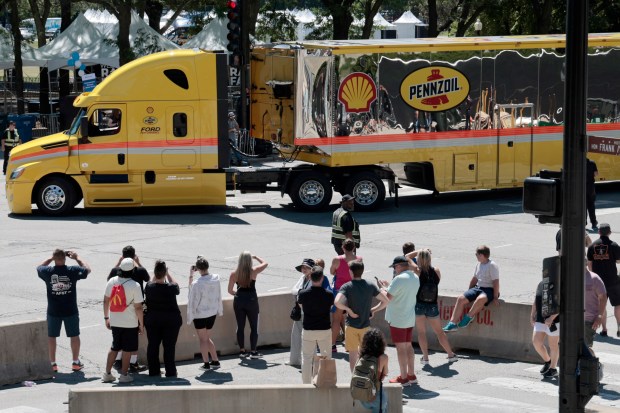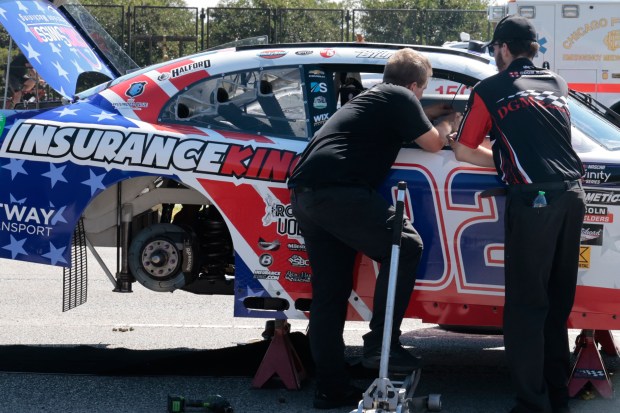Just before the green flag was raised last July, Chicago’s first NASCAR race through Grant Park seemed doomed.
Criticism of closed streets and privatized parks has rumbled on for months. Smoke from Canadian wildfires has lingered. Lightning has canceled concerts and halted a preliminary race. And as the end of a record-breaking rain soaked drivers heading to the start of the main event, even professionals have wondered aloud whether the race will ever happen.
But the skies cleared and all that noise – at least inside the race venue – disappeared behind the sound of car engines roaring on Columbus Drive.
By the end of the race, an estimated 4.8 million viewers had tuned in to watch New Zealander Shane van Gisbergen win his first NASCAR race. The three-hour spectacle, featuring stock cars racing against the Chicago sunset, became the most-watched Cup Series event on NBC in six years.
The weekend forecast predicts that the torrential rains of the first round will be replaced this weekend by the kind of sunny, warm weather that makes Chicago a top vacation destination.
That doesn’t mean NASCAR is universally welcomed at the lakefront. Kristin Enola Gilbert, co-owner of the Exile in Bookville bookstore in the Michigan Avenue Fine Arts Building, said she’ll have to close her doors again on what will be one of the busiest weekends of the year.
“The city is going to do what it wants,” Enola Gilbert said. “That’s something we have to accept.”
However, NASCAR Chicago Street Race President Julie Giese said downtown residents and businesses now have a better deal and a better understanding of what to expect.
“It was so unknown,” Giese said Friday. “Now everyone has a very good understanding of the event.”

Race organizers have made changes aimed at easing resistance from Loop residents who have decried the disruptions. Reduced setup and teardown times this year mean six fewer days of street closures, Giese said.
To make the race more accessible, a public “NASCAR Village” with neighborhood restaurants was expanded and ticket prices for children 12 and under were lowered to free on Saturday and $45 on Sunday, well below the $150 single-day and $269 all-weekend general admission.
And in addition to performances from big names like Keith Urban, the Black Keys, Lauren Alaina and the Chainsmokers, the event’s entertainment will include a local twist with Chicago blues legend Buddy Guy and a showcase of house music.
NASCAR also gave the city gifts. The organization agreed to pay Chicago $2 million to cover police overtime and other expenses related to the event. That money is in addition to a $550,000 park entrance fee, $2 for each of the 50,000 tickets sold and a commission on food, beverages and merchandise.
Last year, the city’s share was $620,000. But the event cost the city at least $3.5 million in police overtime and construction. Some of those expenses won’t be repeated, such as the engineering fees that transformed the streets surrounding Grant Park into a 12-turn, 2.2-mile track.

Race organizers tout an economic impact report that determined the event generated $8.3 million in state and local taxes and a total economic impact of $109 million. NASCAR estimates that number will increase after the success of last year’s race, which was named “Event of the Year” by the Sports Business Journal.
NASCAR said it spent about $50 million on the 2023 race and said the investment generated an estimated $24 million in media value from the exposure Chicago received.
But while City Councilman Bill Conway, 34th, is confident Chicago will once again “shine on the world stage” on the air, he’s not so convinced of the rosy economic picture painted by race organizers. He called the report “not entirely comprehensive” and questioned how much of the reported local spending was actually related to a nearby volleyball tournament that same weekend.
Conway and other downtown councilors surveyed residents about the event, he said Friday.
“They said, ‘NASCAR was a little tough on us, but it wasn’t as bad as we thought,'” Conway said.
There was a strong demand from area residents that the event be held on a weekend that doesn’t coincide with the July 4 holiday, he said. But that request didn’t seem to go unanswered when Mayor Brandon Johnson’s administration announced the race would return for a second year, just as the economic impact study was released in early October.
Conway praised NASCAR’s outreach efforts to the community, adding that “people know what’s coming, which helps.” But he plans to continue pushing for the event to be moved to a different weekend if it continues to return to Chicago.
“Families would like to be able to use the park right outside their door during the holiday weekend,” he said.
The repeat of the race has drawn mixed reactions from downtown merchants. The Chicago Loop Alliance business group is “very supportive” of the race, “a great showcase for the city of Chicago,” spokeswoman Ariella Gibson said.
Gibson praised race organizers for “working very diligently” to make sure Loop residents were informed about everything from street closures to the weekend’s alternative dog park.
“It creates some difficulties, but the results or positive aspects outweigh the disadvantages,” she said.
Gibson admitted that downtown businesses had “mixed opinions” about the event, with Exile in Bookville not the only one closing during the races.
Enola Gilbert said she would be happy to close the store if she knew the race was for “the greater good.”
“But I don’t see that revenue and I don’t see the broader benefit,” she said. “It’s hard enough being a small business. To have to make the decision to close and lose revenue is very unfortunate.”
Other businesses, like the Studebaker Theater in her building, will also be closed, she said. Other large Grant Park events, including Lollapalooza, don’t result in as many closures, she added.
Enola Gilbert had opposed the race before and after the event last year in hopes of getting city leaders to exercise their option not to hold it a second time. She said she was demoralized to learn the event would be held again without any participation.
But at least one person is enthusiastic about the race without reservation. Van Gisbergen, whose racing style outside the United States lends itself well to the twisty course, has brought his family to Chicago for the weekend.
“It’s ridiculous to think that in a city this size you can have a race like this,” the defending champion told the Tribune Friday. “We feel the buzz around it even more than last year. It’s pretty cool to have it here.”
jsheridan@chicagotribune.com